Reason and Emotion: The Children of Desire - Part II
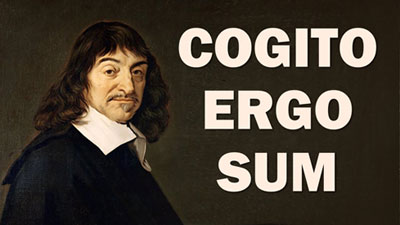
Here's Part II of my rather long essay about Reason and Emotion - how they differ, and how they are related. Here we continue with a historical examination of the concepts. It will be a pleasant stroll down a path that will touch on history, philosophy, psychology, and science. And if you missed it, you can start with Part I. Enjoy!


Much of Christianity is Plato simplified and intensified for the masses. Like Plato himself, the people of second-, third-, and fourth-century Rome lived through a time of instability and decay. As the Empire crumbled due to barbarian raids, corruption, and exhaustion, the Roman citizens sought their own haven from the vicissitudes of life. However, while for Plato the material world was imperfect, for the Christian it was fallen and defiled. While Plato frowned on appetite as irrational and impractical for achieving virtue and happiness, Christianity called the appetites of the body Sin and sought to extinguish desire through fasting, flails, and mortification. And while Plato found it practical to reserve reason for only an elite group of Guardians and Philosopher Kings, Christianity forsook the possibility of reason altogether and instead looked to faith as its greatest virtue.
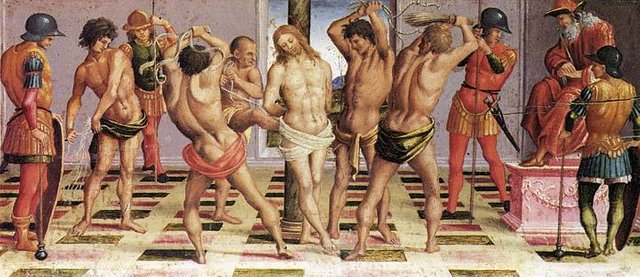
The Flagellation, Luca Signorelli
Nowhere does the dichotomy between body and spirit find a stronger voice than in Christianity. “The spirit is willing but the flesh is weak” (Mark 14:38). As with other pessimistic religions, some Christian sects even believe that the body is a prison for the soul, and that life on earth is an unfortunate weigh-station of suffering and repentance that must be endured. Only by shedding this defiled physical body can we ascend to an immaterial heaven of light, satisfaction, and bliss. Once again, where we find a strong body-spirit dichotomy, we find a divided soul. Desire and appetite come from the body. They are the sinful pull of this world or from Hell below. The faculty of reason, however, enlightened (or corrupted) by faith, is the only part of the soul that can see through the distracting Manna of existence to the holy Light, Truth, and Unity of God. Once again we find more cultural foundation for the separation between reason, on one side, and desire and emotion on the other.

Rene Descartes was a mathematician, a scientist, and a philosopher who lived during the first half of the seventeenth century. His contributions to the first two subjects were massive, but he is best remembered for his mind-body duality and the cogito. Many consider him to be the beginning of modern philosophy.
As a pioneering thinker, Descartes wanted to wipe the slate of philosophical assumptions clean and build from a foundation of absolute truth. Due to his education and travels, he realized that while philosophy “had been cultivated for many ages by the most distinguished men... [there was not] a single matter within its sphere which was still not in dispute." Descartes' method was to doubt all but the most clear and distinct ideas. But to doubt is to exist as a “doubting thing”. And to doubt is to think. By this realization Descartes knew that his self, or his mind, was a “thinking thing”, and, though even the desk he sat at, and the paper he wrote on, could conceivably be false signs sent by a bored, malevolent demon, the knowledge of his own existence and his own capacity for thought could never again be in doubt.
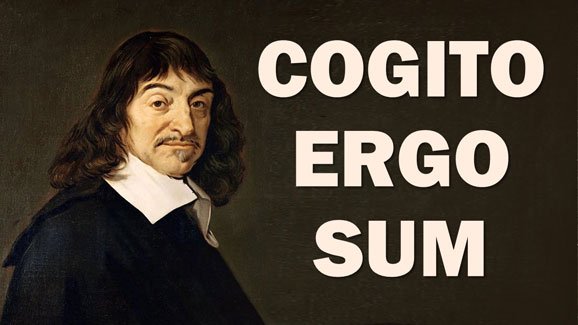
Source
Descartes' goal is an admirable one, but his method causes many problems. He shoves an epistemological wedge between the mind – a term which can too easily be substituted for the Christian's conception of spirit – and the doubtful material of the body and outside world, matter. He inadvertently slices the world in two, and, like Plato before him, describes the mind and its method, reason, as more perfect and knowable than the material and the sensible. Descartes acknowledges that the senses are somehow connected to thought and reason, but he believes that perfect reason must be divorced from the senses because he knows that sight and hearing can be mistaken (Hampshire). Unlike Plato, however, Descartes' dichotomy is one of epistemology rather than metaphysics. His clear and distinct ideas reside in his own mind, whereas Plato's populate the mystical world of Forms.
Even so, this duality between what he senses in the world and what he knows in his mind is so definite that Descartes declares existence to be made up of two separate substances: mind, or primary (non-extended) substance, and matter, or secondary (extended) substance. But how can two substances that have nothing in common interact with one another? How can non-extended mind affect or influence extended matter? Descartes never resolves this issue to the satisfaction of later thinkers.
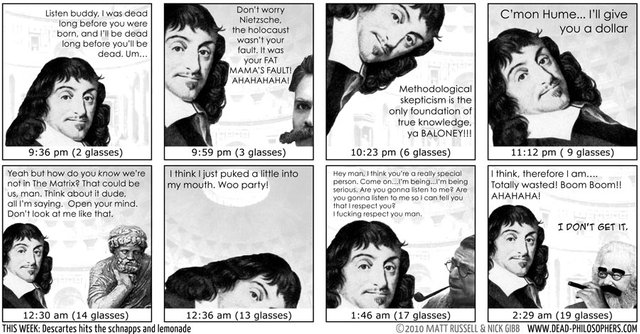
Descartes hits the sauce
Knowing that human beings are a combination of mind and body, Descartes suggests that the pineal gland is a mysterious bridge of communication between the two, and this seems to have satisfied the philosopher. To the modern reader, however, this suggestion seems less clear and distinct than those which Descartes is so insistent on doubting, like the existence of the pen with which he writes, or the sensation of the summer sun's heat on his skin. In any event, Descartes' Meditations turned the Christian body-spirit dichotomy into one of body-mind, and he dressed it in the impeccable attire of reason and intellect.
Modern man grapples with the consequences to this day, and the works of Descartes again leave us with an uncrossable chasm between the fallible emotions and senses of the body, and the possible perfection of the mind's reason.

Throughout most of the eighteenth century, reason beat back the Christian beast of faith and was once again queen of philosophy. Reason was no longer a passive exercise of contemplation but an active tool that could be used to fix the ills of society. Men like Denis Diderot and Voltaire believed that the application of reason could destroy the iniquities of the church and smooth out the inequities of government. They passionately believed in the passionless intellect.

Source
In the philosophes of the Enlightenment, we once again find a thinking elite who considered reason to be higher than both emotion and desire, faculties which they felt were more akin to the life of the animal than to life as a human being. To be a man was to be a mathematician, for mathematics was a rational exercise divorced from the senses . To truly live, one had to exist on an egoless plane, unassailed by individual desire or value.
By the end of the eighteenth century, however, there was a swing away from reason toward faith and emotion. The powder keg of the French Revolution – the violence, the instability, and La Guillotine – seemed to be the result of unchecked intellect. The murderous Parisian mob who decapitated a king, seized the power of state, and handed it over to an Emperor, had been unleashed by decades of cool but rebellious heads.
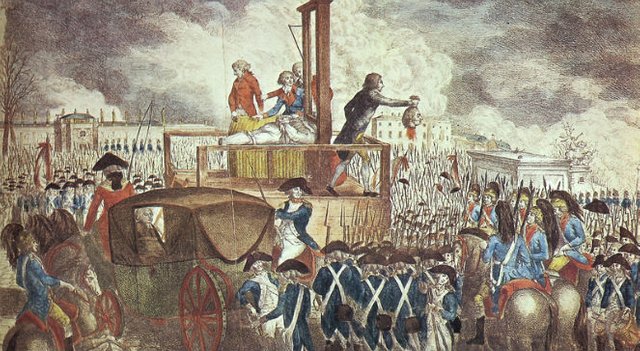
Source
Had it not been for the biting satires of Voltaire, or the atheistic diatribes of Diderot and D'Holbach, the lower classes of France would never have questioned their place in the world. While some condemned reason for this irresponsible result, still others championed emotion as the true spirit of what it means to be a man. Jean-Jacques Rousseau summed up this Romantic spirit best in his Confessions:
Two things, almost incompatible, are united in me in a manner which I am unable to understand: a very ardent temperament, lively and tumultuous passions, and, at the same time, slowly developed and confused ideas, which never present themselves until it is too late. One might say that my heart and my mind do not belong to the same person.”
Once again we see this familiar split between mind and body, reason and emotion; but for Rousseau, it is the emotions that are more valuable and more natural to man. It is Rousseau's conception of the “Noble Savage” – the man who lives untouched by the hypocrisies of civilization, and the pitfalls of academic education – that becomes the ideal of this new Romantic movement. Throughout the first half of the nineteenth-century, this culture war persisted: the struggle between the rational spirit of the Enlightenment and the fiery, colorful passion of Romanticism.

Okay - that's it for Part II. This will be broken down into several parts, and you can find Part III HERE.
If you found this post interesting and/or useful, I certainly appreciate all upvotes and follows. And I'd love to continue the conversation in the comments below. Thanks for reading.
References
- Descartes, Rene. (17th century). Discourse on Method. Garden City: Dolphin Books.
- Hampshire, Stuart. (1956). The Age of Reason: Conflict of Science and Religion. New York: Signet Classics.
- Rousseau, Jean-Jacques. (18th century). Confessions. The Norton Anthology of World
Masterpieces. New York: W.W. Norton and Company.
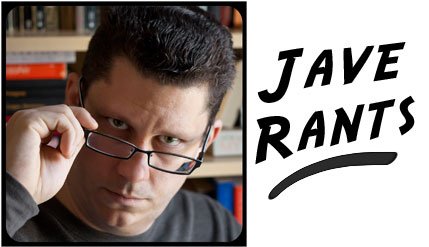
Everyone needs to know the history
This post has received a 1.49 % upvote from @drotto thanks to: @jpgaltmiller.
Upvoted ☝ Have a great day!
Congratulations! This post has been upvoted from the communal account, @minnowsupport, by jpgaltmiller from the Minnow Support Project. It's a witness project run by aggroed, ausbitbank, teamsteem, theprophet0, someguy123, neoxian, followbtcnews, and netuoso. The goal is to help Steemit grow by supporting Minnows. Please find us at the Peace, Abundance, and Liberty Network (PALnet) Discord Channel. It's a completely public and open space to all members of the Steemit community who voluntarily choose to be there.
If you would like to delegate to the Minnow Support Project you can do so by clicking on the following links: 50SP, 100SP, 250SP, 500SP, 1000SP, 5000SP.
Be sure to leave at least 50SP undelegated on your account.
Good story
This post has received a 75.00 % upvote from @siditech thanks to: @jpgaltmiller. Here's a banana!
This post has received a 0.57 % upvote from @booster thanks to: @jpgaltmiller.
This post has received a 33.33 % upvote from @spotlight thanks to www.resteemit.com.